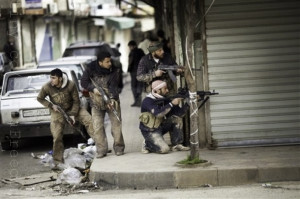Syrian rebel fighters are surging in battlefield sway in part because of a new influx of heavy weaponry from abroad, including from US allies that are receiving help and coordination in their efforts from Washington.
 “The new armaments, including anti-tank weapons and recoilless rifles, have been sent across the Jordanian border into the province of Daraa in recent weeks,” The Washington Post reports, in a purported effort to bolster moderate elements of the opposition and to “counter the growing influence of Islamist extremist groups in the north of Syria.”
“The new armaments, including anti-tank weapons and recoilless rifles, have been sent across the Jordanian border into the province of Daraa in recent weeks,” The Washington Post reports, in a purported effort to bolster moderate elements of the opposition and to “counter the growing influence of Islamist extremist groups in the north of Syria.”
Rebel arms suppliers like Saudi Arabia and Qatar are reportedly relying on a CIA “vetting process” for getting weapons to moderate rebels instead of extremists aligned with al-Qaeda.
But third-party sources and intelligence officials told The Washington Post and the Los Angeles Times last year that the truth is that the US doesn’t know, and has trouble controlling, who is getting the money and weapons.
Dr. Florence Gaub, a researcher at the NATO Defense College, writes at the Carnegie Endowment for International Peace that outside forces can’t end the Syrian civil war. Critically, a political settlement is implausible so long as either side believes they have the upper hand. And, thanks to foreign support, both sides are so emboldened.
“A continuous supply of weapons to both sides—whether from Russia, Iran or the Gulf States—only maintains the parties’ perception that fighting is a better option than negotiating,” Gaub writes. “This explains why, in terms of statistical probability, an external supply of weapons lengthens a civil war.”
The White House reportedly rejected proposals to directly arm the rebels, a decision President Obama is apparently reconsidering.
A top Democrat in the House, Eliot Engel (D-NY), is planning to introduce legislation “to allow the president to arm the rebels,” he explained on ABC’s This Week.
Washington’s support for the rebels has little to no chance of bettering the situation for anyone, and studies show that when civil wars turn into proxy wars they last almost twice as long.


